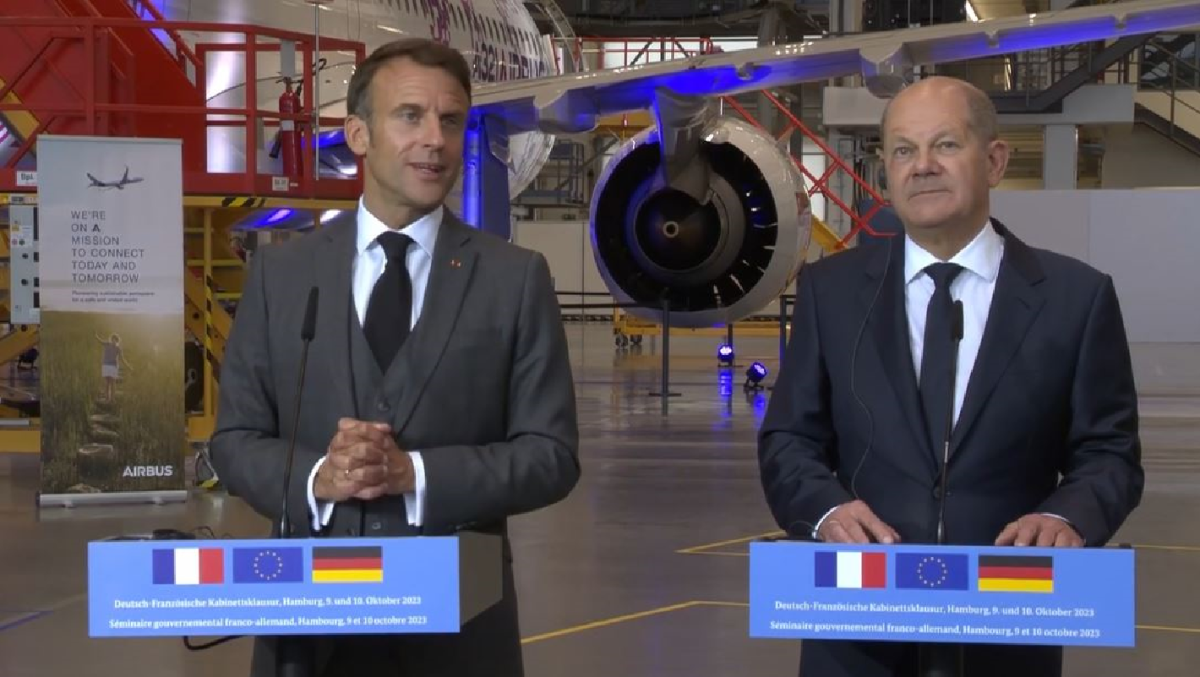Macron, Scholz hail Airbus cooperation as role model for jointly mastering “ecological transition”
Aircraft manufacturer Airbus boasts one of Europe’s most successful industrial cooperation projects, in which France, Germany and other EU states helped create an international market leader, the leaders of the two countries said ahead of an informal meeting of government members on 9 and 10 October in the northern German city of Hamburg, German chancellor Olaf Scholz’s home town. French president Emmanuel Macron said the Airbus plant there demonstrated “our joint courage to make long-term commitments and to invest in technology and human capital.” The aircraft producer showed that the two countries can achieve technological leadership and can be optimistic “regarding the ecological transition and the challenges that come with it,” Macron argued. The informal joint government talks were meant to “create closeness during challenging times,” the president said.
The meeting that was aimed at improving relations between individual government members came after a difficult period in Franco-German relations, which in late 2022 even led to the postponement of a traditional ministerial meeting. Finding a joint stance on energy and climate policy, in particular the EU’s electricity market reform and the role of nuclear power, was expected to be high on the agenda of the countries that struggle to reconcile the crucial differences between their two energy systems. A key EU ministerial meeting, scheduled for 17 October, will deal with questions related to the EU power market reform and the introduction of so-called contracts for difference (CfD) for power producers across the bloc.
The coronavirus pandemic, the war in Ukraine, the climate crisis and many other geopolitical tensions “more than ever” require close coordination between Paris and Berlin for the benefit of Europe at large. Besides questions related to artificial intelligence and digitalisation, this would especially be true for re-industrialisation, energy production, aviation and geopolitical capabilities, the president stressed, promising that “concrete answers” to central questions in this context will follow in the next weeks and months.
More recent cooperation projects struggle to take off as nuclear spat lingers
Chancellor Scholz said Airbus was the poster child for “one of the most successful Franco-German cooperation projects in the industry sector,” which he and Macron were determined to continue. He stressed that the “special relationship built on trust” between France and Germany could serve as a basis for the two countries to confront the challenges facing Europe as a whole. This included the question of “how to achieve social cohesion in times of fundamental change.” Scholz, too, stressed that Europe had to strive to stay in the top league of technological innovation in order to remain “sovereign and strong.”
Headquartered in the Netherlands, European company Airbus was founded through a merger of German and French predecessor companies in 1970. It maintains close ties with the aviation industries of Spain and the United Kingdom. The company has repeatedly defended its position as the world’s largest aircraft producer. However, other, more recent cooperation projects, for example on energy, batteries or military equipment, have yet to produce similarly encouraging results. Both governments have struggled visibly in recent months to formulate a position that bridges the deep divides over the role of nuclear power and the right approach to re-industrialisation in Europe to reduce reliance on other regions of the world in the transition towards climate neutrality.
The vision of greater "strategic autonomy" in key fields including energy security that former German chancellor Angela Merkel proclaimed together with Macron after Donald Trump became U.S. president in 2017, has not yet moved much beyond its stated intentions. The change of government in Germany and the ensuing European energy crisis coupled with Russia’s war in Ukraine have made long-term coordination between Paris and Berlin more difficult, even if all these crises showed that it was urgently needed. France, meanwhile, has doubled down on its insistence to make nuclear power a strategic asset for the EU’s climate neutrality plans.
By highlighting the challenges posed by the U.S. green subsidy scheme, the Inflation Reduction Act (IRA), for Europe’s industrial transformation, Macron’s energy minister, Agnes Pannier-Runacher, urged Germany to come to terms with a EU power market reform that welcomes nuclear energy in order to avoid damaging delays. Allying with eight other pro-nuclear power EU members, the French government, in the run-up to the meeting in Hamburg, sought to back up its demands, such as prolonging the life span of existing reactors. Germany has been rejecting any concessions for state-subsidised nuclear power out of fear that this will unduly distort energy price levels and hinder a swift transition towards renewable power.


